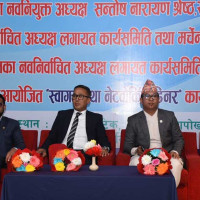- Thursday, 12 December 2024
Nepal, ADB sign deal worth Rs. 21.23bn for two projects
By A Staff Reporter,Kathmandu, Dec. 12: The government of Nepal and the Asian Development Bank (ADB) on Wednesday signed a concessional loan and grant agreement amounting to USD 157 million (equivalent to Rs. 21.23 billion) for the implementation of the Mechanized Irrigation Innovation Project (MIIP) and the Climate Resilient Landscapes and Livelihoods Project (CRLLP).
The grant agreement amounting to USD 15 million (equivalent to Rs. 2 billion) and Loan Agreement amounting to USD 110 million (equivalent to Rs. 14.88 billion) for the implementation of MIIP were signed by Finance Secretary Dr. Ram Prasad Ghimire and Arnaud Cauchois, Country Director of the Nepal Resident Mission, ADB, on behalf of their respective institutions, according to a press statement issued by the Ministry of Finance.
The MIIP will introduce advanced irrigation technologies, including a prepaid card system allowing farmers to access water based on their field’s need. The project will be implemented in Rautahat and Sarlahi districts of Madhes Province, benefiting over 121,000 farmers.
The primary objectives of the project are to improve agricultural productivity, ensure year-round irrigation and contribute to food security.
Additionally, this project will employ the Design, Build, and Operate (DBO) modality and establish an irrigation management company for the long-term sustainability of groundwater irrigation systems in the region, said the ministry.
Similarly, a grant agreement amounting to USD 22 million (equivalent to Rs. 2.97 billion) and Loan Agreement amounting to USD 10 million (equivalent to Rs. 1.35 billion) for the implementation CLRRP were signed by Dhani Ram Sharma, Joint Secretary, Ministry of Finance, and Arnaud Cauchois, Country Director of the Nepal Resident Mission, ADB, on behalf of the Government of Nepal and ADB respectively.
The CRLLP focuses on enhancing the climate resilience of rural communities in the Karnali and Sudurpashchim provinces, which are highly vulnerable to the impacts of climate change.
This project will address water insecurity, promote nature-based livelihoods and empower local communities through the sustainable management of water resources. The project aims to empower communities to adapt to climate challenges by focusing on sustainable water management, agroforestry and forest management.
This project will play a critical role in improving water security and addressing the region’s vulnerability to climate-induced challenges.
Likewise, the project agreement for CRLLP was signed by Badri Raj Dhungana, Joint Secretary, Ministry of Forest and Environment, Deergha Narayan Koirala, Province Secretary, Ministry of Industry, Tourism, Forest and Environment, Karnali Province and Pramod Bhattarai, Province Secretary, Ministry of Industry Tourism, Forest and Environment, Sudurpashchim Province along with Cauchois, representing the provinces and ADB respectively.
In the signing ceremony, Dhani Ram Sharma, Joint Secretary, Ministry of Finance provided an overview of the two projects, highlighting their potential impact on Nepal’s agricultural and climate resilience sectors.
Cauchois underscored the key features of the projects, the financing modalities, and their importance to Nepal’s economy.
Cauchois reaffirmed ADB’s commitment to supporting Nepal’s development goals, particularly in areas of climate adaptation, agricultural productivity and water security.
Finance Secretary Dr. Ghimire expressed his gratitude to ADB for its continued support and partnership.
He emphasised that these projects would enhance not only irrigation infrastructure but also foster climate resilience among some of Nepal’s most vulnerable communities.
He urged the implementing agencies to ensure timely and effective implementation of the projects, aiming for a positive and lasting impact on rural livelihoods.
He highlighted that the introduction of advanced irrigation technologies and sustainable water resource management would be critical to ensuring food security and improving resilience in the face of climate change.
The signing of these agreements marks a significant milestone in Nepal’s efforts to enhance agricultural productivity, improve water security, and build climate resilience.















